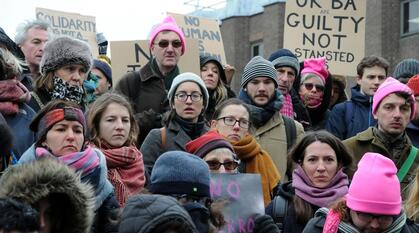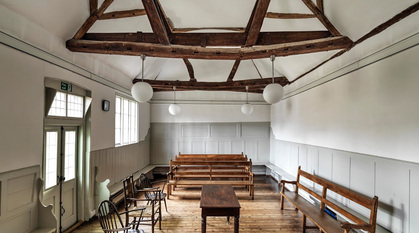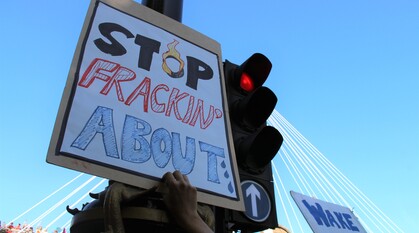Welcoming gender diversity: what does love require of us?
Following the Quaker decision to affirm trans and non-binary people, Fred Langridge reflects on how Quakers can live this out.

At our Yearly Meeting in August 2021, Quakers in Britain recorded:
"We seek to provide places of worship and community that are welcoming and supportive to trans and non-binary people who want to be among us. Belonging is more than fitting in.
With glad hearts we acknowledge and affirm the trans and gender diverse Friends in our Quaker communities, and express appreciation for the contribution and gifts that they bring to our meetings, which are communities made up of people with a diverse range of gender expressions. The end of our travelling is for differences not to divide us. We rejoice in recognising God's creation in one another. This is what love requires of us."
– part of Minute 31
This Yearly Meeting minute (PDF) is a milestone in a journey that began at least eighteen years earlier when central Quaker committees recognised the need for pastoral care of transgender people and those around them. It will continue for months and years as we work out how to put our faith into action and how to make our intention a reality.
Our Quaker statement comes at a time of enormous conflict over transgender rights and acceptance in the wider world. A 2018 UK government consultation and a 2019 Scottish government consultation over possible changes to gender recognition legislation (PDF), were the focus of public debate that has intensified and continued long after the consultations concluded. Articles arguing for and against the removal of trans people's legal rights and social acceptance appear in mainstream media every week, and social media discussions are polarised and often full of anger and hurt.
Welcome and acceptance
Inevitably, this atmosphere of conflict has coloured our Quaker conversations. Many Quaker meetings first became aware of it when a group's booking of a meeting house room led to upset within our communities. I know of several trans and/or non-binary Friends who chose to stay away from Yearly Meeting because 'gender diversity' was on the agenda, feeling or fearing that their existence was up for debate. I am transgender and I chose to be present but I understand their decision.
Some Friends who are not transgender, who perhaps don't know many trans people, expressed confusion that we would need to make an explicit statement of welcome to one group. Surely everyone is welcome in Quaker meetings? As a trans Quaker, I've always felt welcome and accepted by most people, but the rare occasions when another Quaker challenges this acceptance are significant. They stop my spiritual home feeling like a sanctuary.
The context of conflict outwith and within our communities makes the Yearly Meeting statement essential.
Our belonging, as transgender Quakers in our Yearly Meeting, was in doubt.
Living our testimonies
The doubt was not in the minds of all Friends, whether trans or not, but enough to be significant. The doubt was clear in the public record and noted by non-Quakers, calling into question our equality testimony. Minute 31 of our 2021 Yearly Meeting begins the work of clearing that doubt.
Our Quaker truth testimony is relevant here, as well as our equality testimony. In the 2021 Swarthmore Lecture, Thomas Penny described the ways in which truth felt elusive in the early days of the coronavirus pandemic:
"Online technology and increased polarisation had narrowed many people's sources of information, making debate more confrontational and facts harder to pin down… Our news is filtered by those whose political outlook we share, and our critical faculties are suspended in favour of tribal loyalties."
The same problem has affected conversations about trans people. Transphobic campaigning has been framed as concerns about women's rights – with suggestions that many trans women intend to assault women who are not trans – or about children's safety – with suggestions that lesbian or tomboy teenagers are being coerced or tricked into gender transition. Neither of these narratives is true (and both directly echo homophobic campaigns in the 1980s and 1990s), but attempts to counter them are decried as silencing legitimate debate, or 'cancel culture'.
Our Quaker discernment processes rely on mutual trust and shared discipline. We are asked to come to difficult decisions with "an informed mind as well as a generous and loving spirit". When the distinction between information and disinformation is blurred, our processes and our communities are challenged.
Affirming trans and non-binary people
Our Yearly Meeting minute brings us back to what we do know and where we can find unity: there are trans and gender diverse Quakers in our communities, and they are loved. There are trans and gender diverse people who might want to enter our communities, and they are welcome.
So, what next? How do we act on this?
Friends can read, listen and learn. Woodbrooke offers online learning opportunities looking at gender from a Quaker perspective. Local or area meetings can arrange workshops on welcoming gender diversity, through Quaker Life, Woodbrooke or Young Friends General Meeting – email supportmeetings@quaker.org.uk.
As individuals and meetings, we can challenge transphobic messages in the media and in politics, by writing to broadcasters, papers and politicians. We can support organisations working for trans equality. We can visibly support trans people with statements on our websites and in our meeting houses, to let trans people know that they are believed and that they are welcome.
We can look for the overlaps with our other concerns. In our anti-racism work, acknowledge that trans women of colour are at disproportionate risk of violence and death. In the long struggle against sexism and misogyny, recognise that transgender and cisgender women face many of the same barriers and are held to the same impossible standards of femininity.
My simplistic answer to 'what next'? Just believe people when they tell you who they are and how they experience the world. Everything else will flow from that.


